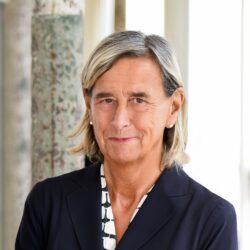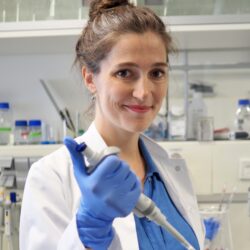Rare diseases affect children and adolescents in eight out of ten cases. Their participation in medical progress therefore depends crucially on dedicated pediatricians who are committed to the balancing act between bedside and laboratory. The Alliance4Rare research network initiated by the Eva Luise and Horst Köhler Foundation provides structured Clinician and Medical Scientist Programs (CS4RARE) to prepare researching paediatricians for this challenging task and to give them the necessary freedom for scientific work at a high level. The programs grant participants protected research periods in which they are released from clinical duties to advance scientific projects on rare diseases.
Dr. Knopf, you have been selected for the Alliance4Rare Clinician Scientist Program. What was your motivation to pursue this particular path in science and clinical practice?
During my specialist training at a large children’s hospital, I came into contact with rare diseases early on, including diseases of the immune system. During my training as a pediatric rheumatologist, my focus was on autoinflammatory diseases – both genetically defined entities and those that can only be classified phenotypically. In children and adolescents with these complex phenotypes, autoinflammation and autoimmunity cannot always be clearly separated. In order to better understand the disturbed regulation of inflammatory pathways, I have increasingly focused on the topic of immune dysregulation and immunodeficiency.
Since March 2022, I have been working with great enthusiasm in pediatric immunology and in an interdisciplinary team. There is a close connection between clinical work and research, which makes the subject so interesting. New disease-causing variants are constantly being discovered and new disease entities described. Every year, the number of definable diseases of the immune system increases. This can be seen, among other things, in the expansion of the groups in the classification of the International Union of Immunological Societies (IUIS), which was recently expanded to include monogenetic auto-inflammatory entities and diseases with bone marrow failure.
What are you currently working on and what would you like to achieve?
I am currently working at the University Center for Rare Diseases (USE) and in the Department of Pediatric Immunology at the Carl Gustav Carus University Hospital at TU Dresden.
My research focuses on auto-inflammatory diseases and the search for new biomarkers to predict disease relapses and improve therapy management. Among other things, we are working with colleagues from Würzburg and Luxembourg to analyze gene expression in children with SURF (systemic undefined recurrent fever or systemic recurrent fever syndrome of unknown origin).
I have high hopes that the establishment of new biomarkers in combination with exome and genome diagnostics will speed up the diagnosis of these diseases, which are very rare and sometimes difficult to diagnose. This will enable us to provide children with targeted therapy more quickly.
What opportunities does the support provided by the Alliance4Rare Clinician Scientist Program open up for you in your day-to-day work that you would not have otherwise?
Being part of the Alliance4Rare offers me the unique opportunity to devote sufficient time to complex patients in order to speed up the diagnosis of a rare disease, in addition to my specialist work in the special consultation hours and my campus-wide consultation work. Just this week, we were able to diagnose a young person with an autosomal recessive disease, which opens up new treatment options and will enable the patient to enjoy a better quality of life with fewer inpatient stays and reintegration into everyday life.
Without this funding, it would not be possible for me to take care of the functional evidence in vitro for gene variants that have not yet been described and not – as in the past – “file away” the unclear findings in the file. After all, the exclusion of a monogenetic rare disease is also important information for patients and practitioners.
Dr. Nina-Christine Knopf studied human medicine at the University of Hamburg and the Friedrich Wilhelm University of Bonn. She completed her training as a specialist in pediatric and adolescent medicine and as a pediatric rheumatologist at the Amsterdamerstrasse Children’s Hospital in Cologne. Since March 2022, Ms Knopf has been involved in the University Center for Rare Diseases (Prof. Dr. Reinhard Berner and Prof. Dr. Min Ae Lee-Kirsch) and the Department of Pediatric Immunology (Prof. Dr. Catharina Schütz) at the Gustav-Carus University Hospital in Dresden.



